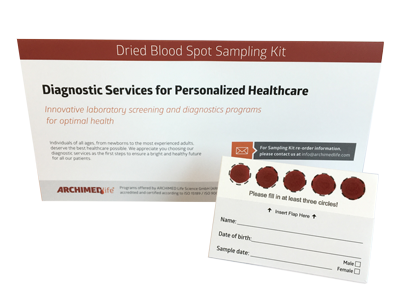Path to Diagnosis
Our service is ideal for the identification of Severe Combined Immunodeficiencies in newborns and children. It includes a dual testing strategy combining biochemical and molecular pre-testing followed by full genetics for a positive pre-test.
Multiple tests are needed to successfully identify potentially affected babies and children.
Testing is fast and safe using Dried Blood Spot (DBS) cards. This simple and minimally invasive technique supplies enough sample for biochemical testing and in most cases genetic confirmation testing as well.

TREC
Healthy children have an abundance of mature T-Cells. T-Cell Receptor Excision Circle (TRECs) are an excellent indicator of the presence of T-Cells in newborns. In babies affected with SCID, TREC levels are very low, almost undetectable.
KREC
Considering SCID is a “combined” immunodeficiency, it is important to evaluate the presence of B-Lymphocytes (B-Cells). K-deleting Recombination Excision Circles (KRECs) are an ideal biomarker for the quantification of B-Cells.
ADA
In ADA-SCID, an enzyme deficiency results in a build-up of deoxyadenosine and is often fatal if left untreated. Determination of adenosine/deoxyadenosine levels is essential to accurate diagnosis.
Quality:
Fully validated and accredited* according to the highest quality standards for Medical Laboratories (ISO 15189).
Methodologies:
- Biochemical assay using Clinical Mass Spectrometry. Molecular assays using quantitative PCR.
- Genetics by Sanger and Next-Generation Sequencing platforms.
About Severe Combined Immunodeficiency
What is Severe Combined Immunodeficiency?
Severe Combined Immunodeficiency (SCID) is a group of rare genetic disorders that are characterized by a severe impariment of the immune system. Severe Combined Immunodeficiency (SCID) is a group of rare genetic disorders that are characterized by a severe impariment of the immune system.
What causes SCID?
SCID is caused by a genetic defect affecting T-lymphocyte (T-Cell) development and function. T-Cells protect against infections and are an integral part of the function of other cells in the immune system (e.g. B-Cells). At least 20 genetic mutations are known to cause SCID resulting in severely reduced T- and B-lymphocyte function (and in some cases NK-lymphocytes).
When should SCID be diagnosed?
Affected children are healthy at birth but suffer from severe infections and secondary organ damage in the first six months of life. Early detection is critical for SCID babies as the success rate of bone marrow transplant is almost 95% when the transplant occurs prior to 3.5 months of age [1].
How to Order SCID Diagnostic Services

Our Diagnostic Service for Severe Combined Immunodeficiency includes a molecular pre-test for TREC/KREC and a biochemical pre-test for ADA-SCID as well as any necessary genetic confirmatory testing.
All of our services are available to any interested physician or healthcare professional worldwide.
As part of our diagnostic services, we supply complimentary ARCHIMEDlife sampling kits. You can order your sampling kits and diagnostic services through our easy and secure WEBPORTAL and receive your electronic medical report in five simple steps.
Five Simple Steps
1Order Sampling Kit
2Collect the Sample
3Register the DBS Card
4Return the Sample
5Receive your Report